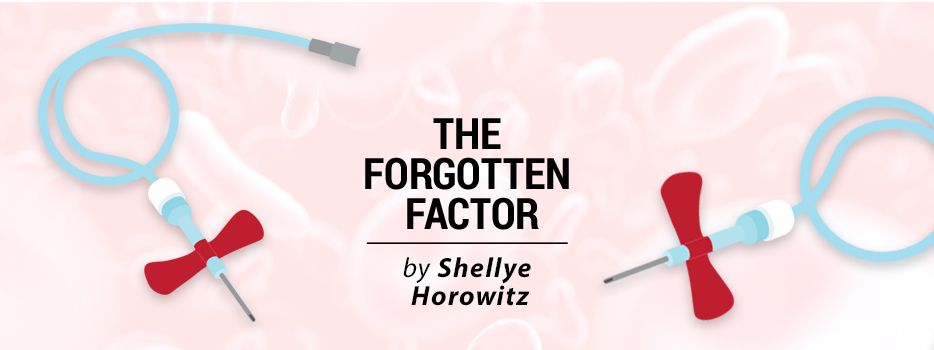‘My Child Is OK, Doctor, They Have Hemophilia’
Written by |

It was Christmas in 1978. My brother was thrilled that Santa had brought him exactly what he wanted — a large, bright red firetruck with a ladder that really worked! (Never mind that we were Jewish. Santa always seemed to make an appearance at our home anyway, and we never complained.)
My brother played with his truck all morning, and I played with my new Barbie dolls.
Then I went outside to play. Riding my bike with the neighborhood kids was so much fun. We would compare what Santa had brought to each of our homes. But when I came in from playing, I tripped down the stairs, and my chin broke my fall — on the ladder of my brother’s new firetruck.
I screamed. I cried. I bled. Then, I kept bleeding. It soon became clear to my parents that the bleeding wasn’t going to stop. I needed stitches. This was not new to them. My dad picked me up and took me to the emergency room.
That time it took three stitches to get the bleeding to stop. Many years later, my father told me he was worried he and my mom would be accused of child abuse. It was already the fifth injury I was getting stitched up to stop the bleeding.
Creative safety
As a toddler, I was constantly falling over and bruising myself. My parents wanted to protect me from bruising and got creative. They taped diapers over any corner or surface they thought I might hurt myself on. Apparently, my godfather saw their piano all wrapped up in diapers and exclaimed, “So that is why it is called a ‘baby grand!'”
Fear of false accusations
I have heard many families with children who have hemophilia express fears of being misunderstood. They worry that daycare centers, schools, doctors, or babysitters may accuse them of abuse.
Sadly, parents in our community have indeed been accused of abuse. It often happened while they were seeking medical advice and answers to why their children were getting injured.
Emotional toll of delayed diagnosis
Delayed diagnosis of bleeding disorders can take an emotional toll on families. People can see their children are physically hurt, but they have no explanation. In the absence of explanation comes blame.
When a parent is wrongly accused of abuse, it is devastating. Some parents have even had their children with hemophilia taken away from them by child protective services. Often the children are returned once the hemophilia diagnosis is understood. However, the trauma of having their family torn apart unnecessarily is not something that is easily forgotten.
Growing awareness
As awareness of bleeding disorders continues to grow, more children access diagnosis and treatment. Early diagnosis means less chance of well-meaning child welfare workers removing children from their homes. Thankfully, this does not happen often. But the fact that it happens at all is devastating.
Document and share
I recommend that all parents document their child’s bleeding disorder and share the information with all the adults in their child’s life. This communication will help prevent misunderstandings. It also will widen the circle of support, allowing many adults to keep an eye on the child with hemophilia.
Furthermore, documenting bleeds and bad bruises is also helpful. This allows their medical professionals to understand their bleeding phenotype. In doing so, they can better tailor their care.
If a person suspects their child may have a disorder, but they do not yet have a diagnosis, it is critical to document things thoroughly. Helping doctors understand your concern for visible and nonvisible injuries may help them know this is not a case of abuse. Please do not let fears of false accusations stop you from pursuing proper diagnosis and treatment for your child.
It would be many years before I received a proper hemophilia diagnosis and access to appropriate care. I was so thankful when I did.
Parenting is hard. Parenting a child with a bleeding disorder is even harder. Ensuring that the parent is supported as they seek proper diagnosis and care for their child is critical.
Once there is a proper diagnosis, the family can relax, knowing their child’s issues will be better understood. And little girls with hemophilia can play with their Barbie dolls and their brother’s firetrucks.
***
Note: Hemophilia News Today is strictly a news and information website about the disease. It does not provide medical advice, diagnosis, or treatment. This content is not intended to be a substitute for professional medical advice, diagnosis, or treatment. Always seek the advice of your physician or another qualified health provider with any questions you may have regarding a medical condition. Never disregard professional medical advice or delay in seeking it because of something you have read on this website. The opinions expressed in this column are not those of Hemophilia News Today or its parent company, Bionews, and are intended to spark discussion about issues pertaining to hemophilia.



Leave a comment
Fill in the required fields to post. Your email address will not be published.